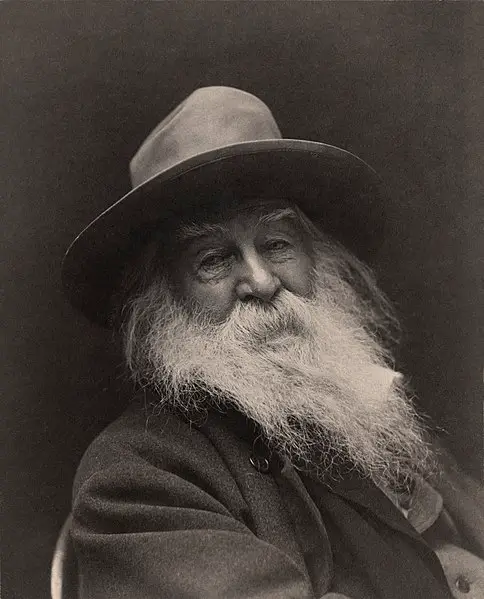Walt Whitman
Born: 1819
Birthplace: New York
Died: 1892
Walt Whitman is considered to be one of the most influential American poets. He had a desire to alter the traditional poetic style and include many of the pictures of American freedom of the time.

His book “Leaves of Grass” is self-published and although at the time was very controversial, it has been a part of American culture. Whitman is referred to as the “Bard of Democracy.”
- Whitman was born in 1819 in West Hills, Long Island, New York. His family had been initially farmers; however, before he was born, a lot of the land had been sold. This caused the family that included eight children to struggle.
- Whitman’s parents raised him to have an incredible love for his country and democracy. When Whitman was three years old, the family relocated to Brooklyn in hopes of new job opportunities. Sadly, it didn’t happen, and his father was forced to take Whitman out of school when he was eleven years old so that he could work and help to support the family. Whitman took a job at an attorney’s office in Brooklyn as an office boy and then later in a business involved in printing.
- By the time Whitman was 17, he made the decision to teach and took this profession to a variety of Long Island locations. He searched for an alternative to teaching and turned to journalism, working for a weekly publication called the “Long Islander” in 1841. When that publication went out of business, he moved to New York City, where he continued his newspaper career and started writing fiction. By 1846 Whitman was the “Brooklyn Daily Eagle” editor, and he continued there for nearing two years.
- Whitman was known for having very specific opinions that weren’t the same as the readers or those in the newspaper. His ideas on women’s rights, labor topics, and immigration were considered to be radical at the time. As a journalist with a volatile pen, he expressed his disgust about New Yorkers that looked up to some of the backward European ways. While he stood up for what he believed in, it also meant that he paid the price by not remaining long at any newspaper.
- Whitman’s short relocation to New Orleans in 1848 allowed him to be the editor of the local paper the “Crescent,” but while he only stayed three months, he witnessed the horrors of slavery.
- Returning to Brooklyn in 1848, Whitman started the “Brooklyn Freeman” newspaper. He used the paper to express his anger about slavery and knew that slavery would have a negative effect on democracy and the country. As a writer, he began keeping notes about his observations, and these would eventually be looked at as some of his most powerful poetic creations.
- Whitman had searched his entire life to find his own personal writing style. In 1855 he had decided upon what voice he wanted to take and self-published a collection of twelve poems. The preface of his book was “Leaves of Grass,” and he could only pay for the printing of 795 copies. The writing was a complete change from the traditional poetic formats. He spoke in the first person, and the style wasn’t rigid.
- Getting little attention, Whitman revised “Leaves of Grass” with 32 poems and published it. Ralph Waldo Emerson had liked his first book, but it was the second book that brought Henry David Thoreau to meet Whitman in person. Whitman’s father had died, and he was forced to live in the family home with dysfunctional family members that included alcoholics and the mentally handicapped. It wasn’t until a third edition of “Leaves of Grass” was published it began to be noticed.
- The Civil War changed everything, and Whitman took on a few jobs, including a nurse to visit wounded soldiers. These experiences involved over 600 visits to the hospital, and it inspired him to go back to writing poetry. His collection called “Drum-Taps” was published in 1865 and was followed by 18 more poems in “Sequel.”
- Whitman worked at the Indian Bureau of the Department of the Interior and published “Democratic Vistas” and “Passage to India” as well as the “Leaves of Grass” fifth edition in 1870.
- His stroke in 1873 changed his life, and he couldn’t continue to work. By this time, he was making some money on the publication of his work. His health got worse, and Whitman died in 1892.
Q&A:
What is the name that people give to Walt Whitman?
Bard of Democracy
What is the name of Whitman’s first self-published book?
Leaves of Grass
What profession to Whitman leave to get into publishing?
Teaching
What experience exposed Whitman to the horrors of slavery?
Living in New Orleans for three months
Why did Whitman lose so many jobs in the newspaper industry?
He was a volatile journalist with radical opinions
What two famous poets came to admire Whitman’s work?
Ralph Waldo Emerson and Henry David Thoreau



